Over the next few weeks we will publish interviews with Spanish growers, starting today with an article featuring Antonio Maldonado.
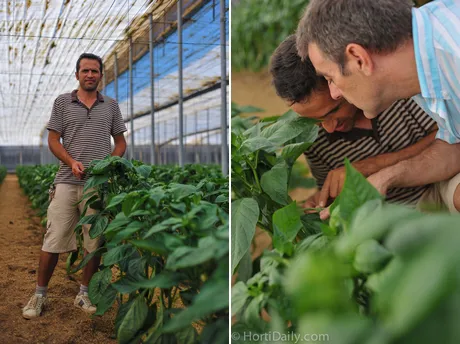
Antonio Maldonado is growing peppers and cherry tomatoes on the vine in Las Norias. Maldonado has got 5 hectares with blocky peppers and 2 hectares of cherry tomatoes. This year the grower opted to plant Rijk Zwaan's Acorde F1. He planted the crop on the 9th of July and depending on the market situation he will start harvesting a green or red fruit. "Sometimes the market for green peppers is a little bit better, so then we will pick them green, in this case we will start harvesting in one month. If we choose to harvest red fruits, we will have to wait another month till the end of October."
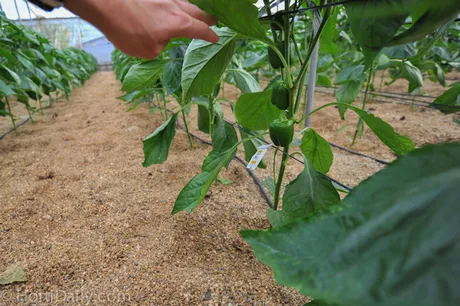
First fruits are on the plant. Underneath the peppers hangs a sachet with BioBest' Swirkii's.
Looking back on last season, Maldonado is speaking of a dark, wet, hard season. "Last season was a tough climate for us" he said. "We had a lot of problems with disease pressure of botrytus in peppers and eggplants. In October 2012 it was very warm, but in November it was extremely cold and the rain came. December was polite, but in January and February the rain came and production stayed very low. Due to the low production, the prices where very good, so this compensated our loss and at the bottom line is was a very good year, financially."
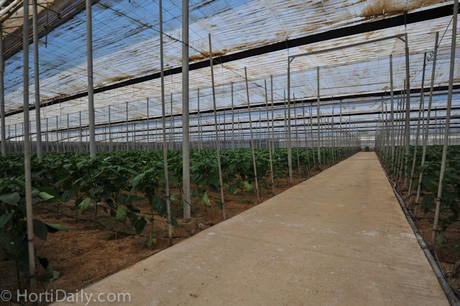
Maldonado cultivates in multiple sections. This one is 5,000 meter with peppers. In total his has got 8 compartments with peppers and 2 with cherry's on the vine.
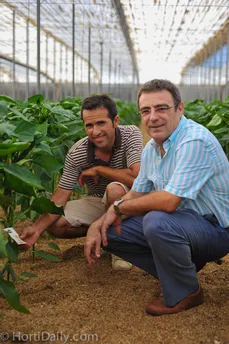 Maldonado said that the customers of the cooperation he is associated with are demanding responsible grown and residue free vegetables. Despite the grower is aiming to last as long as possible without the use of additional chemical crop protection, Botrytus is a disease that the growers in Almeria currently can't fight without spraying. Luckily he has smart biological solutions to fight the most common pests.
Maldonado said that the customers of the cooperation he is associated with are demanding responsible grown and residue free vegetables. Despite the grower is aiming to last as long as possible without the use of additional chemical crop protection, Botrytus is a disease that the growers in Almeria currently can't fight without spraying. Luckily he has smart biological solutions to fight the most common pests.Together with technical advice from Juan Luis Perez from biological crop protection supplier BioBest, Maldonado developed a strategy with preventive measures to fight the whitefly. Maldonado has preventively installed a strong population with Swirski predatory mites. Thanks to Swirskii's polyphagous character and its adaptability to work in high temperatures, this predatory mite plays an important role in Maldonado's greenhouse. "Right now we hang one sachet with Swirskii on every six plants," said Maldonado. "Later we will also install Orius bugs, they are the only predators that also attacks thrips larvae and adults."
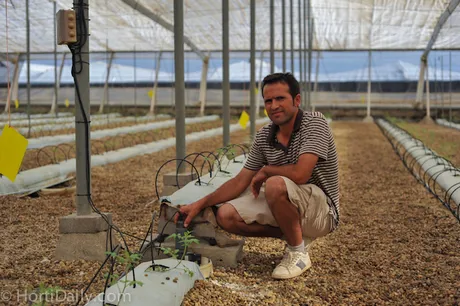
Maldonado in his greenhouse with cherry truss tomatoes. The crop, a variety by Clause, was planted in week 34. During propagation at a local nursery, a population of predatory mirid bug Nesidiocoris tenuis is brought in the young plants. In this order, Maldonado is sure that the population is in full force when Whitefly and Tuta threathens his crop.
Maldonado and Perez want to be sure to install a strong population on every plant. This is all to prevent the outbreak of a devastating plague. But if things seem to get out of hand, they always have another ace in the hole.
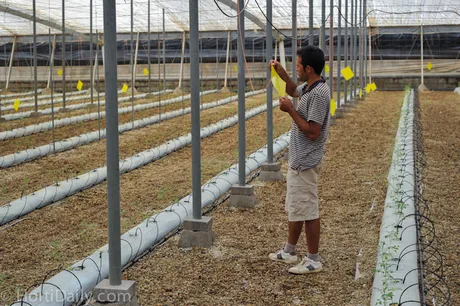
Maldonado scouting the sticky traps in of the rows. He opted to grow his crop in a perlite substrate. "Perlite is very easy for us to grow, it is somewhere inbetween coco and rockwool. I don't prefer to grow on rockwool, because when you make a small mistake in irrigation you can get in trouble very easily, perlite is a bit more easier", Maldonado said.
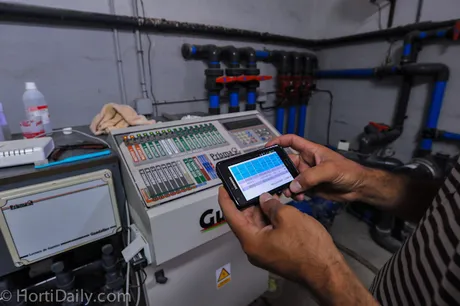
Maldonado is irrigating his crops automatically with a Prisma web server application from Guadalfeo. From his mobile phone, Maldonado can adjust the settings of his Guadalfeo irrigation unit and observe the inside temperature, rv, ec and all other basic parameters.
"When dealing with excessive tobacco whitefly (Bemisia tabaci), the Eretmocerus mundus is very specific and well adapted to control excessive whitefly pests in countries with a Mediterranean climate or mild climate," said Maldonado.
"In the past we had to spray against whitefly when it was getting out of hand, but nowadays we have the Mundus as complementary solution."
 For more information:
For more information:Biobest N.V.
Ilse Velden 18
2260 Westerlo - Belgium
T +32 14 25 79 80
F +32 14 25 79 82
www.biobest.be
[email protected]
